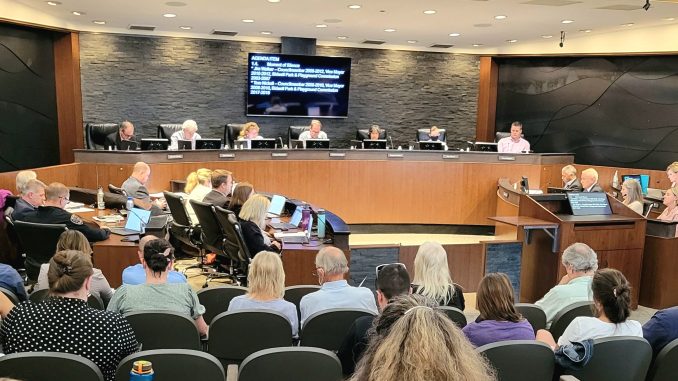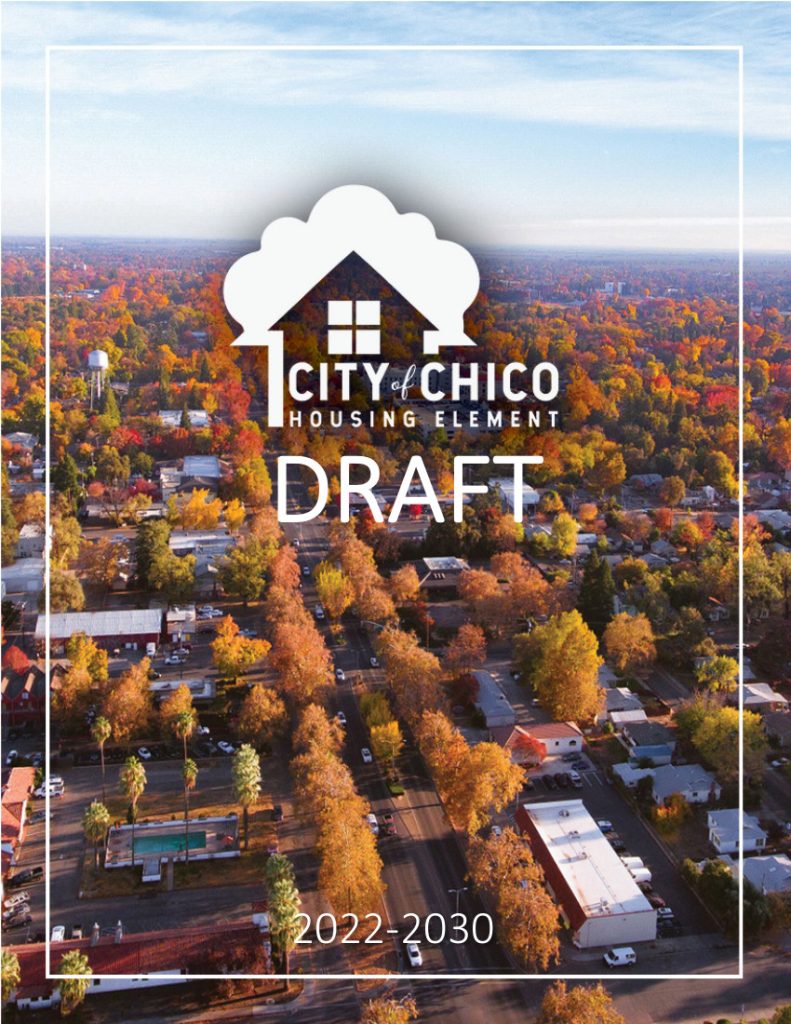
Nostalgia permeated the start of the Chico City Council meeting Tuesday night (Aug. 2). Chambers packed to capacity, Boy Scouts waited at the rear of the room for a formal presentation of colors. Mayor Andrew Coolidge followed a minister’s invocation with tributes to two late vice mayors, Jim Walker and Tom Nickell, leading separate moments of silence for each. Coolidge praised both men, former members of the council and the park commission, for reaching across partisan lines to serve citizens of Chico.
The deja vu that followed had a more recent echo. Reflecting its contemporary tone and dynamics, the council found itself divided on the issues on the agenda—two “quality of life” items and the housing element update—and from residents on annexing “islands” within city limits. Members also denied another cannabis license appeal, this one from an applicant whose supporters included a former councilman aligned with the majority.
Councilwoman Alex Brown, the one progressive among six conservatives, dissented as usual on most key matters and the next morning shared her familiar position.
“This council is not a council that reaches across the aisle,” she said by phone. “They have full steam ahead moved forward with putting their values at the forefront. … As much as I’m willing to respectfully engage in conversation and dialog, and ask questions, I can’t say I have any faith in this council to have any willingness or reason to compromise. They’ve demonstrated that with every single action they’ve taken.”
Case in point for her came late in the four-hour meeting, when the council resumed discussing a quality of life initiative. At the July meeting, conservatives instructed City Attorney Vince Ewing to redraft a ballot measure put forward by Vice Mayor Kasey Reynolds the previous month, “Protect Chico’s Quality of Life Act,” whose provisions included the city paying citizens should it not respond to their complaints of code violations in a timely manner. Ewing found significant legal exposure in the measure as written, and the council demurred.
The revised version expands the Chico’s public nuisance ordinance to add city-owned properties; nothing else, no use of the term “quality of life.” Reynolds submitted an addendum proposing a Quality of Life Improvement Commission “to formulate proposed ordinances and resolutions for recommended council adoption regarding … safety, cleanliness, beauty and economic vitality of the city”—and, in a document supplied to her colleagues on the dais, language refining Ewing’s.
Councilman Sean Morgan, who expressed reservations at the previous meetings, again took pause. He encouraged Reynolds to bifurcate the measure, separating the idea of a commission from code enforcement. He addressed each in an individual motion.
First, Morgan moved to instruct the city attorney’s office to meld Reynolds’ document into the proposed ballot measure. Second, he moved for creation of an ad hoc committee comprising the council’s Internal Affairs Committee and council-appointed citizens to discuss quality of life issues, with the potential for its evolution into a commission. Reynolds seconded both motions, which passed 6-1, over Brown’s “no” votes. Afterward, the vice mayor told the CN&R she was happy with the outcome.
“That’s the beauty of being here: We have seven different personalities, and we all need to give our input and mesh our ideas together, and we came up with something that will work,” Reynolds said. “[The committee] is the most important piece, because we’re going to have an avenue for people to get together, to be able to do the hard work. … This [forum of council meetings] is not conducive to having those kinds of conversations. There’s also going to be a way [via nuisance abatement] for people to be able to come in and file a complaint.”
Morgan wasn’t wholly sold on the proposition, notably a new piece of government, but told the CN&R he sought a compromise to keep the process moving and arrive at something workable.
“That’s what politics is,” he said. “When council members make requests, I try to support them because they’re supported by the community, so if they’re asking for it, someone in the community is asking for it, so I think we should at least pay it credence unless it’s ridiculous. I don’t think any of the things we talked about tonight were ridiculous; just the path getting there was complicated when perhaps we could make it easier.”
Brown noted how the process could be easier still. She echoed an observation by Coolidge that the council could adopt code changes without the effort and expense—$25,000—of a ballot measure that the city must race to put before voters in November.
City Clerk Debbie Presson relayed a deadline of next Tuesday (Aug. 9) to pass the measure on to the Board of Supervisors in time for it to be considered during its next meeting, at which the consolidated election must be approved ahead of an Aug. 12 deadline. So, the council will hold a special meeting Thursday (Aug. 4) to approve a measure and its associated ballot components.
The mayor prefaced his vote with comments indicating he may oppose the measure ultimately. He told the CN&R that he will advocate for the council to modify the municipal code in regards to nuisance abatement on public property.
“It’s not something I’m necessarily sold on yet,” Coolidge said. “I’d have to see how this would function, the cost behind it; I’m concerned about those aspects. I’m concerned about if the city says, ‘OK, citizens, you can report area of public property and we have 20 [business] days to clean it up,’ I’m not sure we can do that, whether we have the resources to do that.
“So that’s really where I find it needs to be discussed more, and I’m not sure that the timeline [for a ballot measure] is conducive to that.”
From the dais and to the CN&R, Brown labeled the initiative “a performance art piece”—an effort designed to score political points.
“This version of the ballot measure is like a square peg in a round hole,” she continued. “It’s a way of getting something moved forward that has evolved from what it started as, pretty significantly, because it didn’t pass muster.
“What I’m reading in this ballot measure and efforts to create some sort of quality of life commission or committee or whatever it may be is that government as-is—which is a majority conservative government—can’t make decisions for themselves, can’t make spaces for themselves where people are heard, can’t listen and integrate those ideas if they actually believe in them and want to pass the buck and put the responsibility in other people’s hands, particularly the people that elected them.”
Reynolds had requested a second discussion related to quality of life, an item that got tabled July 5. She sought an assessment of “what the city can do within the confines of the [Warren v. City of Chico] settlement agreement to improve the quality of life in Chico.” Reading the room, and with the clock about to hit 10 p.m., the vice mayor moved to refer the item to the Internal Affairs Committee, which Councilwoman Deepika Tandon seconded and all but Brown voted in favor.
Other deliberations
Two other items involved external mandates. The housing element meets a state requirement, and annexing unincorporated islands fulfills an agreement with Butte County’s Local Agency Formation Commission (LAFCO), an agency with oversight on land-use planning and provision of services.
Tuesday night culminated a year-plus process updating the housing element, which covers June 2022 to June 2030 (the city has a 120-day grace period in which to file). The city Planning Commission held two meetings this summer and gave recommendations to the council, which Community Development Director Brendan Vieg presented.

Planning staff agreed with some, but not all, of the commission’s recommendations, which ranged from listing particular properties among sites deemed adequate for development to flexibility in parking requirements to expansion of specific zoning types. The council approved the document with staff’s directions—the 6-1 vote once more with Brown in dissent.
“It’s par for the course, unfortunately, that the housing element seems to meet all of the requirements without doing anything to significantly improve housing conditions in the city of Chico,” she said. “We have been woefully under our targets for low- and very-low income housing and pretty significantly above the above-moderate income housing thresholds that we’ve set every time that we’ve done this exercise, and things that could have a significant impact or at least be creative [such as inclusionary zoning affordability requirements on developments] were either softened or rejected.”
Coolidge said the housing element balances staff and commission recommendations while accounting for uncertainties. He cited a remark from Vieg that 10 affordable housing projects since creation of the 2014-21 element are at sites not identified in that document.
“While government can say, ‘Hey, we have all these properties available for low-income housing,’ that doesn’t make low-income housing magically developed,” he added. “It’s important that government provide that resource and show where that possibility can occur, but till someone in the private industry does that and it pencils economically for them, which in some cases it does, it’s not going to come to fruition.”
On the matter of annexation, the council heard from 13 residents either outright opposed to or worried about their homes switching from county to city jurisdiction. The city agreed in March to absorb four unincorporated areas over the next four years—neighborhoods located at West Sacramento Avenue, West East Avenue, El Monte Avenue and Chico Canyon Road.
Vieg told the council that with the exceptions of the city’s ban on burning leaves and restrictions on animals (the latter grandfathered for current owners), residents would experience no significant difference as city residents versus county residents. The council ratified the annexations 6-1, with Reynolds in dissent.
Reynolds and Brown diverged from others on the commercial cannabis vote. Chico Cannabis Collective appealed its exclusion from group of the three finalists that advanced to the final phase of the licensing process. Former Councilman Bob Evans was among the speakers who championed the owners’ cause, questioning how the firm was leapfrogged with no explanation provided. The council upheld the denial 5-0 with abstentions from Reynolds and Brown— the same outcome as previous appeals.
Among other actions from a packed agenda, the council unanimously renewed the Downtown Chico Property Business Improvement District (PBID) for five years after a tally of votes from property owners indicated 82.6 percent approval.


Be the first to comment